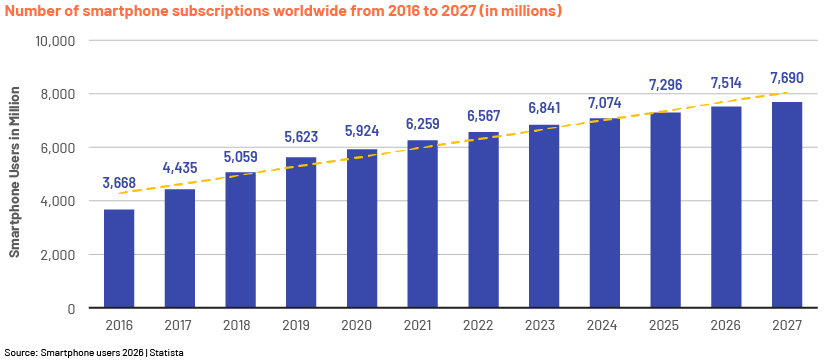Published on August 22, 2022 by Akanksha Singh
Introduction
The world around us is changing, and it is critical that market research transform digitally to keep up with this change. Businesses today need actionable and robust insights to match their customers’ changing expectations, and this has proven to be one of the major driving factors for the market research sector adopting more streamlined and innovative approaches.
The pandemic has accelerated the rate of this transformation, with technology at its core. Thus, the market research sector is rapidly expanding and adopting technologies such as automation, advanced analytics, artificial intelligence/machine learning and neuroscience in its operations.
Technologies leading this phenomenal transformation:
1. Mobility
There are approximately 6,567m smartphone users worldwide; they are expected to reach 7,690m by 2027, according to a report from Statista.

In an interconnected world, mobility helps the sector get faster and easier access to target customers, collate information and engage more efficiently. Unlike with traditional methods, customers can now be a part of the process at a time and place convenient to them, making it a win-win situation for all parties involved.
Additionally, the instant connection afforded by mobility ensures faster turnaround, enabling a faster customer reaction to the experience and making it more genuine; this enhances the quality of data by eliminating the chances of inaccurate recollection.
2. Automation
Market researchers are under constant pressure to deliver high-quality reports faster – this is where automation has proven to be beneficial. In addition to benefits such as cost efficiency, faster turnaround, consistency and improved quality, it enables the researcher to invest more time in decision-oriented activities rather than task-oriented ones.
A report from GreenBook suggests that automation will play a vital role in charting and infographics, analysing image and video data, report writing, attribution analytics, analysing biometrics/non-conscious data, matching contract “talent” to projects, analysing data, integrating into larger business intelligence frameworks, sampling, survey and project design.
We have analysed the impact of automation on market research; access the blog here.
3. Social listening
The number of social media users and platforms is rapidly increasing. In 2021, the number of social media users was over 4.48bn globally, with 145 minutes a day spent, on average, across channels, according to a report from Backlinko.
As the number of social media users increases, so do opportunities for innovating market research processes. Social media, with its many forums and online communities, has facilitated determining target audiences and gaining more information about them. It also helps access customer opinions in real time and gather more profound insights. Social media also plays a significant role in finding trends in the vast number of terms used; this is extremely valuable to research teams.
Researchers could also leverage social media for competitive analysis, to gain insight on their campaigns and analyse customer perceptions of their products or services.
4. Advanced analytics
Data collection is the first step to gaining insights; thus, the data must be refined and error-free, and this is where advanced analytics play a vital role. They enable businesses to fine-tune data from collection to curation, ensuring the accuracy of the entire process, while saving significant time. Additionally, advanced data-collection software provides real-time connectivity, enabling error-free and instant data sharing.
Advanced analytics optimise operations even in dynamic markets, an area where traditional data analytics are found lacking.
5. Artificial intelligence (AI)
With increasing data sources in the form of social media and other digital technologies, datasets are becoming increasingly complex. AI helps analyse these complicated datasets to gain detailed insights and assess customer behaviour. AI is gradually transforming the dynamics of market research and influencing the sector, mostly through text analytics, advanced data analysis and machine learning.
AI helps in the many processes of market research, including proactive community management to improve predictions of behaviour and construct user interaction profiles, often with support from technology research consultants. It also helps in conducting secondary research, for example, through chatbots and virtual moderators and conducting virtual market research.
Our detailed analysis of the impact of AI on market research can be accessed here.
Conclusion:
Digital transformation is taking the world by storm, and market research is not left untouched, evolving gradually with advancements enabled by technology research services – one innovation at a time. However, this is just the tip of the iceberg, and we can expect a number of innovations in the future, some of which include augmented and virtual reality, eye tracking, microdata, the internet of things (IoT) and wearables.
Acuity Knowledge Partners enables digital transformation through services including interactive survey scripting and programming, social media integration, interactive online reporting solutions and data processing and visualisation. If you are looking to get started, feel free to get in touch with our subject-matter expert for a strategy session.
Sources:
Smartphone subscriptions worldwide 2027 | Statista
5 Ways Technology Has Impacted Market Research (freedoniagroup.com)
Tags:
What's your view?
About the Author
Akanksha Singh is a Delivery Lead within the Survey Programming and Data Processing line of business at Acuity Knowledge Partners (Acuity). She holds a PGDM in Marketing and Communication and has over 8 years of experience in business development and content marketing for various industries including IT and ITES, Finance Tech, Healthcare Tech, Environmental services, and the Insight industry.
Like the way we think?
Next time we post something new, we'll send it to your inbox










